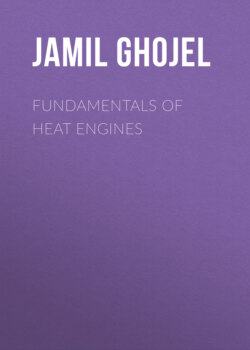Читать книгу Fundamentals of Heat Engines - Jamil Ghojel - Страница 44
1.3.3.1 Adiabatic Processes
ОглавлениеAn adiabatic process is one where the energy of the system changes only by means of work transfer, and there is no heat crossing the boundary. The relationship between the state properties can be written as
(1.48)
The volume V can be replaced by the specific volume v = V/m, which yields the additional equation p1/p2 = (v2/v1)γ. The exponent γ is the ratio of specific heat capacities. The specific heat capacity (the word capacity will be dropped in future references) is defined as the amount of heat energy required to raise the temperature of a unit quantity of matter by one degree Celsius (on a mass basis c in J/kg. K and on a mole basis C in J/kmole. K). The specific heat at constant pressure is written as cp in J/kg. K or Cp in J/kmole. K and at constant volume as cv in J/kg. K or Cv in J/kmole. K. Both cp and cv increase with temperature. Table A.1 in Appendix A shows the molar specific heats at constant pressure of some gases as a function of temperature. The specific heat at constant volume can be determined from the following equations, assuming the gases behave as ideal gases:
